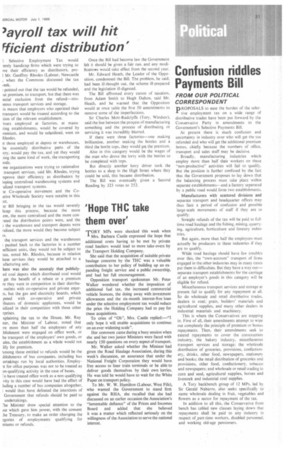'ayroll tax will hit Fficient distribution'
Page 33

If you've noticed an error in this article please click here to report it so we can fix it.
Selective Employment Tax would crely handicap firms which were trying to we their efficiency as distributors, pro: Mr. Geoffrey Rhodes (Labour, Newcastle , when the Commons discussed the tax
6.eek.
: pointed out that the tax would be refunded, ut premium, to transport, but that there was iecial exclusion from the refund—misteous transport services and storagc.
is meant that employers who operated their transport would be treated according to the Lion of the relevant establishment.
ivers employed at factories, at manuring establishments, would be covered by wemium, and would be subsidized. went on P..hodes.
It those employed at depots or warehouses, he essentially distributive parts of the ;try, would pay the tax, and yet they would )ing the same kind of work, the transporting )ods.
me organizations were trying to rationalize transport services, said Mr. Rhodes, trying nprove their efficiency as distributors by Loping centralized warehousing systems and alized transport systems.
se Co-operative movement and the Coative Wholesale Society were notable in this
le Bill bringing in the tax would severely heap this process. because the more ent, the more centralized and the more con-ated the distribution points were. and the : the warehouses and transport depots were ralized, the more would they become subject
the transport services and the warehouses pushed back to the factories in a number iefficient units, they would not be subject to tax, noted Mr. Rhodes, because in relation hese services they would be attached to a ufacturing unit, here was also the anomaly that publiclyed coal depots which distributed coal would get the benefit of a rebate or a premium re they were in competition in their distribuoutlets with co-operative and private enter:s, but the gas and electricity boards, which peted with co-operative and private ibutors of domestic appliances, would be iidized in their competition with these other rprises.
xplaining the tax to the House, Mr. Ray iter, the Minister of Labour, noted that ire more than half the employees of any .blishment were engaged on office work, or he transport of the employers' own goods, or ales, the establishment as a whole would not lify for premium.
ikmong those entitled to refunds would be the iblishments of bus companies, including bus .ertakings run by local authorities.. Employit for office purposes was not to be treated as on-qualifying activity in the case of buses.
7co have treated office work as a non-qualifying vity in this case would have had the effect of luding a number of bus companies altogether. would thus have defeated the intentions of Government that refunds should be paid to undertakings.
he Minister drew special attention to the Ise which gave him power, with the consent he Treasury, to make an order changing the :gories of employments qualifying for miums or refunds. Once the Bill had become law the Government felt it should be given a fair run. and any modifications would take effect from the second year.
Mr. Edward Heath, the Leader of the Opposition, condemned the Bill. The problem, he said. had been ill-thought out, the scheme ill-prepared and the legislation ill-digested.
The Bill affronted every canon of taxation. from Adam Smith to Hugh Dalton, said Mr. Heath, and he warned that the Opposition would at once table the first 50 amendments to remove some of the imperfections.
Sir Charles Mott-Radclyffe (Tory, Windsor), said the line between the process of manufacturing something and the process of distributing or servicing it was incredibly blurred.
If there were three factories—one making brilliantine, another making the bottles and a third the bottle tops, they would get the premium.
Also in this category would be the wages of the man who drove the lorry with the bottles to be completed with tops.
But directly another lorry driver took the bottles to a shop in the High Street where they could be sold, this became distribution.
The Bill was eventually given a Second Reading by 323 votes to 252.




























































































































